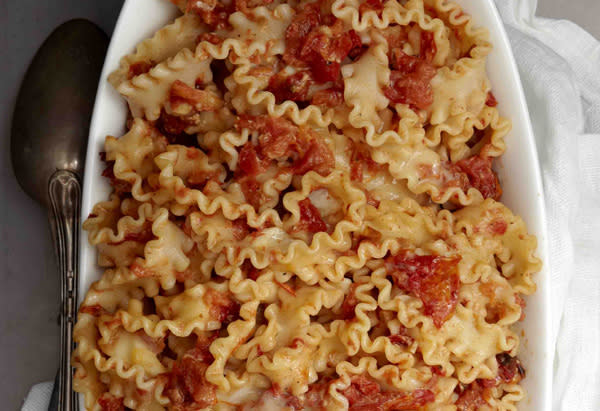4 Things We Didn't Know About Pasta

By Lynn Andriani
Fresh Pasta Is Not Always Better Than Dried
"There is nothing like fresh, homemade pasta," Domenica Marchetti, author of The Glorious Pasta of Italy , says, "but I won't say one is better than the other." Many supermarkets now carry artisan boxed pastas. They're a little more expensive, but they're still comparatively cheap, and since they are cut with bronze dies (instead of Teflon dies, which some lower-quality commercial brands use), they have a rougher surface to which sauce clings well (like mafalde, which is a natural for a roasted-tomato sauce). Cheaper brands also cook less evenly and can turn mushy before they're cooked all the way through.
Get the recipe: Mafalde with Roasted Tomatoes, Robiola and Crushed Fennel Seeds
RELATED: 31 Fresh Summer Pasta Recipes
Keep Calm, Know Your Allies
If you are going to make fresh pasta, take a deep breath and call upon the help of two kitchen workhorses: your food processor and your freezer. Marchetti says, "The key is to just relax. The more you do it, the more you familiarize yourself with the dough's tactile quality, and the easier it'll get." A food processor saves time and still turns out tender dough (even Marchetti's Italian-born mom uses one). And if you aren't going to eat the pasta right away, the freezer is your ally. Marchetti learned the hard way that some hand-shaped pastas-like these codette (which look like string beans but are actually pasta)-cannot be dried before cooking; they just crack, splinter or won't even cook through. So to be safe, either boil the pasta immediately and eat it right then, or roll it out and stash it in the freezer. When you're ready to eat it, take it directly from the freezer to the pot of boiling water.
Get the recipe: Spinach Codette with Sausage and Peas
RELATED: How to Get Your Kids to Eat Healthy
Whole Wheat Needs the Right Sauce to Be Delicious
Something about the chewiness of whole wheat pasta doesn't mesh well with lighter tomato sauces. But its earthy flavor and texture can work in certain recipes, especially those involving the hearty heft of cream or beans. Marchetti pairs whole wheat fettuccine with Savoy cabbage, cream and caraway seeds; whole wheat shells with fresh cranberry beans and braised radicchio; and whole wheat orecchiette with broccoli and cream.
Get the recipe: Orecchiette with Creamy Broccoli Sauce
RELATED: Jessica Seinfield's Afternoon Snack Ideas for Kids
Pasta Is Surprisingly Versatile
When Marchetti was a child, her family had a beach house on Abruzzo's Adriatic coast. A casual restaurant there served spaghetti with mussels, shrimp, saffron and curry. It seems un-Italian, but Spaghetti al Farouk was the signature dish at the seaside restaurant.
Get the recipe: Spaghetti al Farouk
RELATED: Knead, Pray, Love: Making Homemade Pasta
More from O, The Oprah Magazine:
